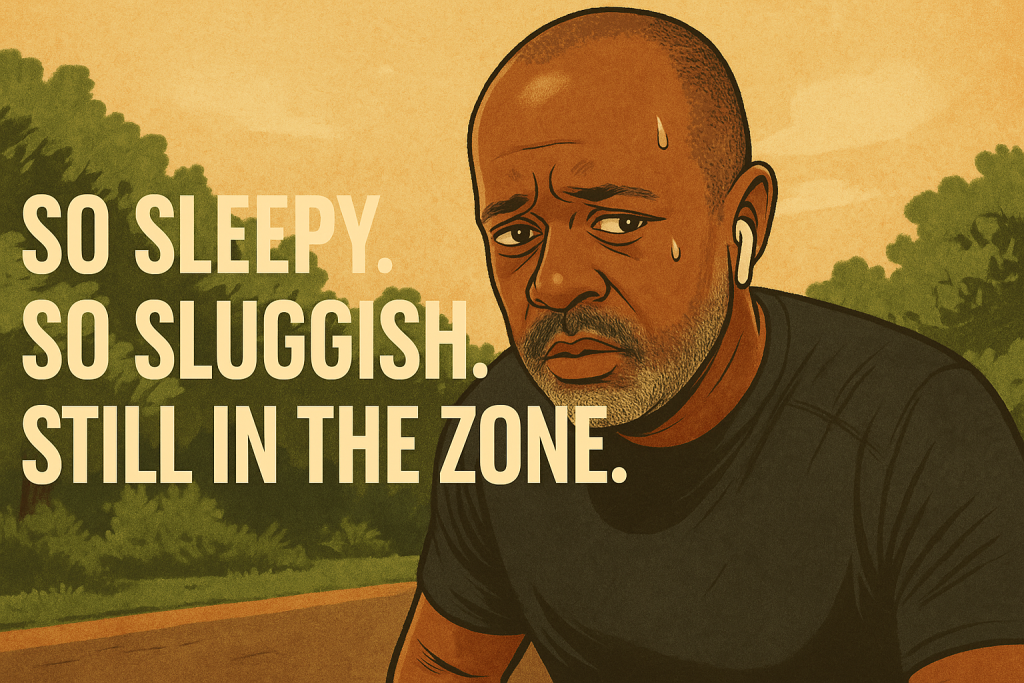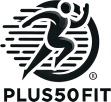Sore legs. Foggy brain. But I showed up.
Even when you’re in the zone, your legs don’t always get the memo. On July 30, 2025, I headed out for a Zone 2 easy run with heavy legs and even heavier eyelids. What should’ve been a smooth recovery effort turned into a test of grit, reminding me how lingering fatigue can sneak in during a marathon build.

Let’s break it down.
Sore legs. Foggy brain. But I showed up.
I started the morning with a wake-up shower that didn’t really wake me up. I sipped some Nuun about 30–45 minutes before my warm-up. No formal pre-run fueling, but I did take a GU Liquid Energy and two SaltStick Saltchews just before heading out. I stayed consistent with my SaltStick every 2K after that.
My legs were lumbering – definitely some residual fatigue from yesterday’s progression run, and probably a cumulative effect from the heat all week.
I let binaural tones guide my rhythm and did my best to stay in low to mid Z2. It wasn’t pretty, but it was progress.
📊 Run Metrics Overview
| Metric | Value |
| Duration | 45:05 |
| Distance | 6.64 km |
| Avg Pace | 6:48/km |
| NGP | 6:36/km |
| Elevation Gain | 166 m |
| rTSS / hrTSS | 62 / 44 |
| IF (pace / HR) | 0.86 / 0.73 |
| Pa:HR | 7.37% |
| Avg HR / Max HR | 144 bpm / 154 bpm |
| Avg Cadence | 165 spm |
| Calories Burned | 382 kcal |
| Weather | 19°C, Humid (87%) |
📈 What Your Numbers Say
- Pa:HR of 7.37% suggests a manageable level of aerobic decoupling – right on the cusp of ideal. Despite fatigue, your body held up under load.
- IF (pace) of 0.86 vs IF (HR) of 0.73 shows you ran the pace, even when your heart was lagging behind a little. That’s typical when fatigued but still pushing steady effort.
- hrTSS was lower than rTSS, reinforcing that your body wasn’t firing on all cylinders, but the external load was still there.
- Cadence held at 165, showing solid form even through the sluggishness. Great consistency.
🧠 Coach’s Corner
You’re not just feeling the fatigue—you’re wearing it. And yet, this is exactly where you build that marathon backbone. Today’s Zone 2 easy run is a textbook case of how to handle recovery work when energy dips: execute the plan, don’t chase the pace. You were on profile for the prescribed pace range (6:42–7:08/km), and while it felt harder than it should’ve, your metrics show solid aerobic control.
That sluggish feeling? It’s a sign that your training is stacking – not failing.
🏁 Conclusion
Not every run feels strong, but every run adds strength. This morning was slow, heavy, and hazy – but I hit the marks. Even sluggish kilometers still count.
🟠 Fatigue: 48
🔵 Fitness: 38
🟧 Form: -8
A perfect recipe for real-world progress.
🧘♂️ Recap, Recover, Relax & Ready.

[…] Check out earlier Zone 2 Run with fatigue insights […]
[…] Previous Z2 in the heat: Zone 2 Easy Run – July 30 […]